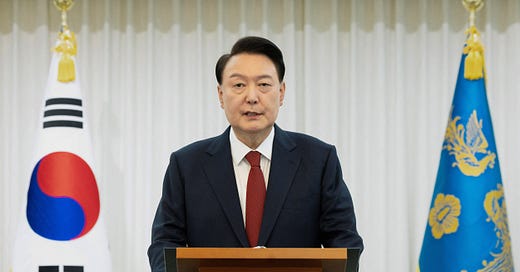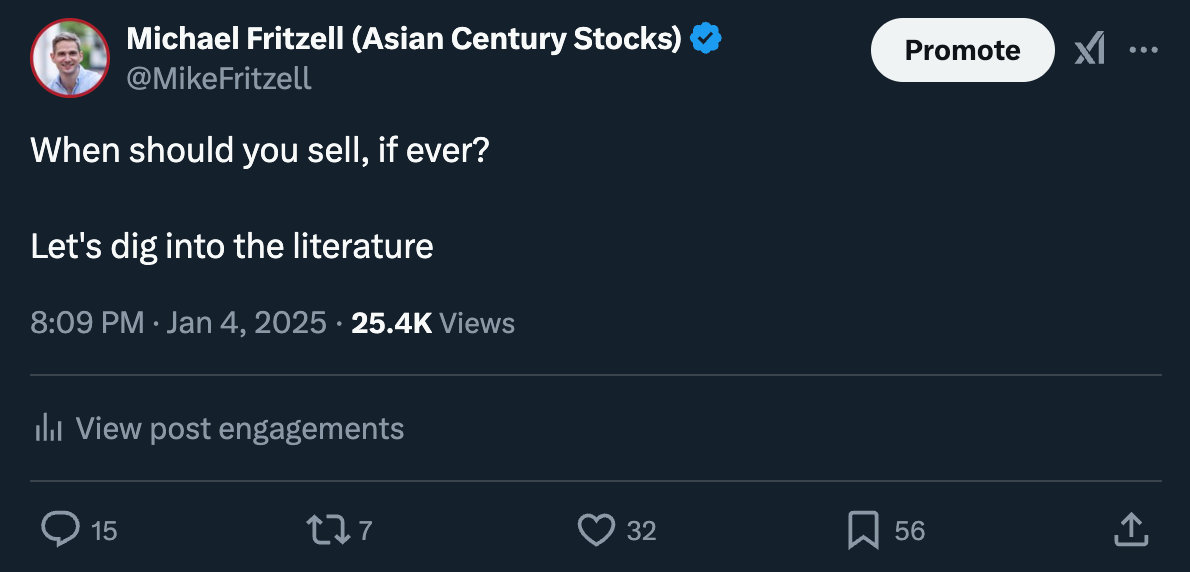I just finished a book on the history of entrepreneurship in Sweden. It’s called Besvärliga människor, which translates into “troublemakers” — referring to how entrepreneurs often disrupt the status quo.
While the book has nothing to do with Asia, it helped me understand the conditions necessary for entrepreneurship to blossom. In Sweden’s case, it was the introduction of limited liability corporations in 1848 that led to Sweden being the second-fastest growing economy in the world in the following century. I’m seeing parallels with China in the 1980s, when freedom of trade led to a similar outburst of creativity.
I’m now looking forward to reading Made in India, which discusses the history of entrepreneurship in India from 1947 onwards.
Post of the week
Yesterday, I published a post about South Korean President Yoon Suk Yeol’s imposition of martial law on 3 December 2024. The event took investors by surprise. I argue that Yoon probably had pure motives but that he was tone-deaf about how he went about going after his enemies. If opinion polls are accurate, Lee Jae Myung will become the next President. The most significant implication for equity markets is that Yoon’s Corporate Value Up program is likely dead. But none of this matters for equities, in my view. The bottom line is that Korean stocks trade at a record-low P/E ratio of just 8x despite Korea’s success in tech and cultural exports. You can read my full post here.
Tweet of the week
I skimmed through John Train’s classic book Money Masters of Our Time to understand how investors think about selling stocks. And I then summarized my findings in a Twitter thread. Seth Klarman argues that one should sell a stock when it reaches fair value. Peter Lynch thinks that you should sell a stock if something you expect will happen, doesn’t. And for the greatest companies out there, investors seem to agree that the best time to sell is — almost never. In Bob Wilson’s words, “It’s better to sell a winning stock too late than too soon”.
Podcast episode of the week
I loved Jake Barfield’s interview with Hikaru Tsushin’s CEO, Hideaki Wada. The company is often likened to the Berkshire Hathaway of Japan. The company was built from scratch by Yasumitsu Shigeta, initially selling mobile phones, then developing a wholesale electricity business, and finally acquiring a range of companies he deemed undervalued. But while Shigeta seems to have the right mindset regarding capital allocation, I think Hikari Tsushin’s high return on equity is more because it’s an asset-light sales organization. Its investment arm probably benefitted from the bull market we’ve seen in Japanese equities, and that bull market won’t last forever. But you judge for yourself:
Join the community!
This was a teaser email from Asian Century Stocks. Consider subscribing to the full offering. I write over 20 high-quality deep dives yearly, in addition to thematic reports and monthly portfolio disclosures. Right now, I offer a 30-day free trial:
Disclaimer: Asian Century Stocks uses information sources believed to be reliable, but their accuracy cannot be guaranteed. The information contained in this publication is not intended to constitute individual investment advice and is not designed to meet your personal financial situation. The opinions expressed in such publications are those of the publisher and are subject to change without notice. You are advised to discuss your investment options with your financial advisers. Consult your financial adviser to understand whether any investment is suitable for your specific needs. I may, from time to time, have positions in the securities covered in the articles on this website. This is not a recommendation to buy or sell stocks.





